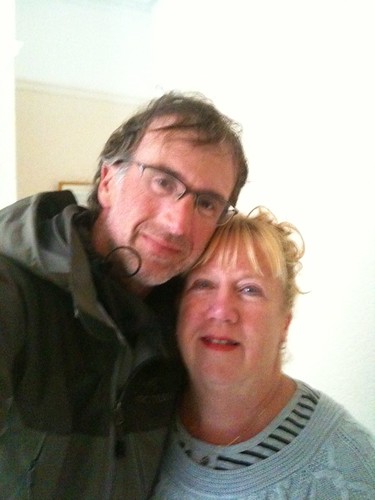 I’m in Ramsgate, the north sea looks magnificent today.
I’m in Ramsgate, the north sea looks magnificent today.
I feel very much down because of what’s happening, but happy to learn that even now, this voyage is a powerful generator of life.
Since leaving London I felt strange pains to my left lung and breathing was problematic.
In the last two weeks, in Faversham, this got worse and I often could not even walk without having to stop to recover my breath.
Sometimes I had to lay down.
When arrived in Ramsgate things worsened dramatically. After two nights of strong wind and much noise due to the Dynamo Day event, the pain became unbearable and breathing very hard indeed. My brain could not get enough oxygen and even simple actions like walking became an adventure.
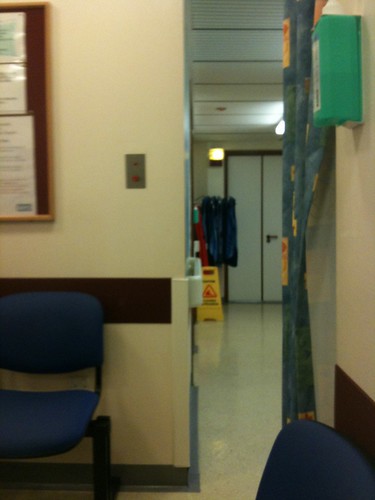 Jacopo took me to the Queen Elizabeth Hospital in Margate: there I’ve been analysed, x-rayed, scanned and examined in record time, by lovely people displaying great professionalism, kindness and humanity.
Jacopo took me to the Queen Elizabeth Hospital in Margate: there I’ve been analysed, x-rayed, scanned and examined in record time, by lovely people displaying great professionalism, kindness and humanity.
At the beginning they feared a pulmonary embolism, then further exams disclosed a virus that has settled in my lungs and in my brain. Never mind the brain, but the lungs are far more simple and genuine, built to perform a simple but essential task.
I’m now under antibiotic and cortisone, trying to rest. My energy is low but I often get out to see the Channel waiting for me, and Clodia impatient to set sails again.
I hope to get better in about ten days, maybe less. Once the inflammation disappears I should be able to breath normally. Cortisone does some magic.
I must say that I usually never use medicines, opting for natural way of treatment. However this time I faced two alternatives:
A – try to transform into an anaerobic being
B – six month of natural therapy.
I’m sorry to feed my body with antibiotic and cortisone, even a slow-traveling project, but timing is now important. I hope you may understand that this slow down, appearing as an annoyance, became to me a great enrichment. As Aeschylus wrote in his extraordinary tragedy, the Agamemnon, “the pain of grief brings wisdom and experience”.
 The anxiety, the people following this voyage, all those asking why we don’t keep going, Jacopo frustrated by this forced waiting: They all put lots of pressure on me.
The anxiety, the people following this voyage, all those asking why we don’t keep going, Jacopo frustrated by this forced waiting: They all put lots of pressure on me.
The weather, the events, my health, the promises not kept by others, the slow downs: Everything plotted to take me to this point and learn that this was the only way.
I could have been in a very akward situation, would things have developed differently.
We’ll cross the Channel along with sombody that we’ll find here or in Dover, regardless of any support boat. Sailors already annoyed me: Often so arrogant and incapable of any solidarity. Conrad is turning over in his grave.
So weird: In so much water I missed air.
A big hug and a huge thank to everyone for your support.
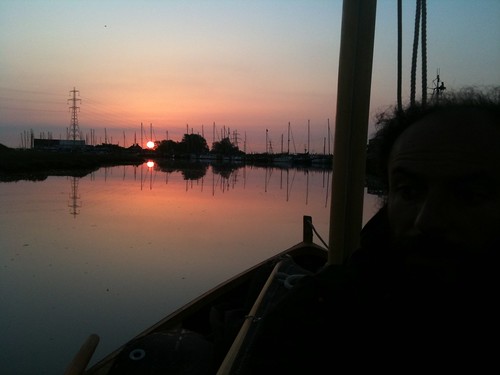 After so many days of waiting and silence, at last we set off again! We are hailed by the brightest sun, that makes the sea look like a mirror.
After so many days of waiting and silence, at last we set off again! We are hailed by the brightest sun, that makes the sea look like a mirror.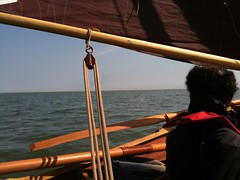 What I call the “English Heel” is a place feared even by the most experienced sailors. We are approaching a cape and pheraps it wants to remind us who is in charge here!
What I call the “English Heel” is a place feared even by the most experienced sailors. We are approaching a cape and pheraps it wants to remind us who is in charge here!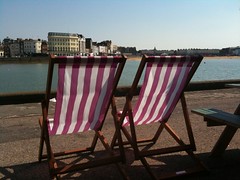 Margate has been one of the favorite seasides of Londoners for over 250 years.
Margate has been one of the favorite seasides of Londoners for over 250 years.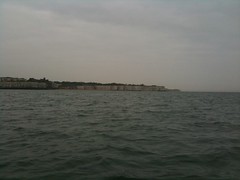 The next morning our journey restarts.
The next morning our journey restarts.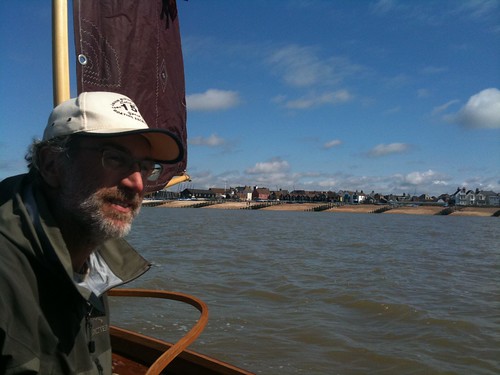 We are about to leave both the UK and Kent, “The Garden of England”.
We are about to leave both the UK and Kent, “The Garden of England”.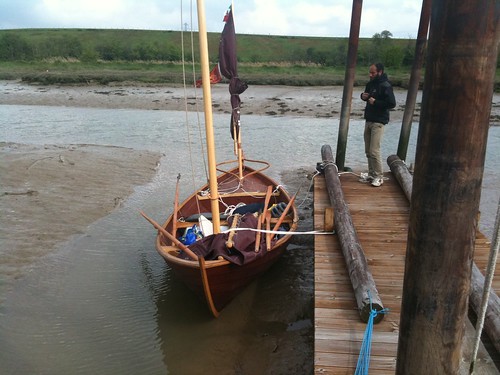 We’re still in Faversham, but now we moved to the Oare Creek, a muddy channel where our life is regulated by the five-metres tide coming to visit every six hours.
We’re still in Faversham, but now we moved to the Oare Creek, a muddy channel where our life is regulated by the five-metres tide coming to visit every six hours.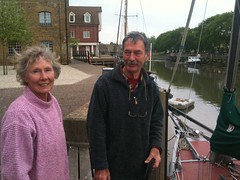 In these last days we kept meeting very interesting people, as Bob and Lena. He’s English and she’s Swedish: they live by trading in boat’s spare parts coming from all over the world.
In these last days we kept meeting very interesting people, as Bob and Lena. He’s English and she’s Swedish: they live by trading in boat’s spare parts coming from all over the world.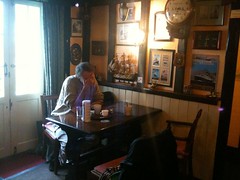 The weather has been very bad, with plenty of rain and strong winds: now the clouds have gone and we can appreciate beautiful starry nights, although the temperature drops as low as 1°C.
The weather has been very bad, with plenty of rain and strong winds: now the clouds have gone and we can appreciate beautiful starry nights, although the temperature drops as low as 1°C. We’re still in Withstable: The weather is slowly getting better after four days of strong wind and heavy sea.
We’re still in Withstable: The weather is slowly getting better after four days of strong wind and heavy sea. Johnny lives happy with his family, writing books about cycling.
Johnny lives happy with his family, writing books about cycling.  Whitstable has been our home for the last week: It seems a long but time just flew. Sometimes Johnny comes to visit, telling us new punk stories.
Whitstable has been our home for the last week: It seems a long but time just flew. Sometimes Johnny comes to visit, telling us new punk stories. They show us wonderful pictures of the Withstable bay, full with hundreds of Oysters Smacks. What a boat, and what a magnificent art of building sailboats.
They show us wonderful pictures of the Withstable bay, full with hundreds of Oysters Smacks. What a boat, and what a magnificent art of building sailboats.
 Faversham is a wonderful town, with many medieval and sixteen century houses. It was the first Roman city in England and it’s crossed by the Creek, a small canal, that is dried for six hours a day. The harbour is small but very important: Sometimes Henry VIII used to dock his fleet in the Creek. Here, as in Withstable, we meet many people that seem to come out from a Dickens’ tale.
Faversham is a wonderful town, with many medieval and sixteen century houses. It was the first Roman city in England and it’s crossed by the Creek, a small canal, that is dried for six hours a day. The harbour is small but very important: Sometimes Henry VIII used to dock his fleet in the Creek. Here, as in Withstable, we meet many people that seem to come out from a Dickens’ tale.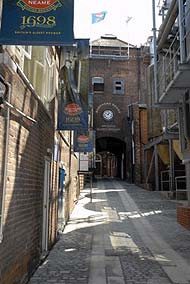 There are pubs though, and there is beer. In Faversham you can see the oldest British brewery, Sheperd Neame, built in 1698. The smell of beer, hop and roasted malt pervades all the town. At first it seems bizarre, reminding one of chemicals, then you get used to it realising it’s a natural flavour.
There are pubs though, and there is beer. In Faversham you can see the oldest British brewery, Sheperd Neame, built in 1698. The smell of beer, hop and roasted malt pervades all the town. At first it seems bizarre, reminding one of chemicals, then you get used to it realising it’s a natural flavour. Right now we are rested and happy. To all of you asking about when we’ll cross the Channel we have to answer: When the sea and the wind will say “yes”.
Right now we are rested and happy. To all of you asking about when we’ll cross the Channel we have to answer: When the sea and the wind will say “yes”. Tomorrow we’ll go to Faversham. We’ve been Whitstable Yacht Club’s guests for far too long and we’re embarassed by their generosity.
Tomorrow we’ll go to Faversham. We’ve been Whitstable Yacht Club’s guests for far too long and we’re embarassed by their generosity. We have to cope with a painful separation: Our hearts are broken when we decide to leave behind our stove. Clodia is overloaded already and we have to make sure it’s reliable and light enough for Channel crossing.
We have to cope with a painful separation: Our hearts are broken when we decide to leave behind our stove. Clodia is overloaded already and we have to make sure it’s reliable and light enough for Channel crossing. Sticking to the spell that seems to have been cast over us lately, in the last two miles before destination the wind is our enemy: either it drops or it gets far too strong.
Sticking to the spell that seems to have been cast over us lately, in the last two miles before destination the wind is our enemy: either it drops or it gets far too strong.


 Our days pass by working on Clodia and meeting lots of nice people.
Our days pass by working on Clodia and meeting lots of nice people. Whitstable is a beautiful city, lived by kind people. It has seen the world’s first railway line, in 1830, the “Canterbury and Whitstable Railway”. What a place to stop for a project about sustainable travelling!
Whitstable is a beautiful city, lived by kind people. It has seen the world’s first railway line, in 1830, the “Canterbury and Whitstable Railway”. What a place to stop for a project about sustainable travelling!






















